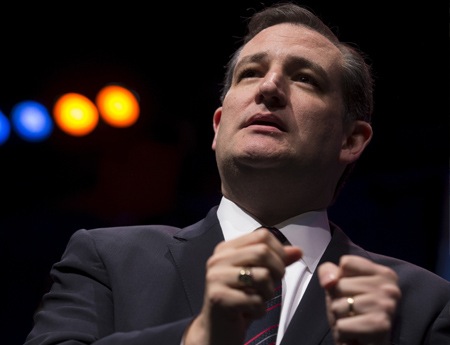Cruz Control

The smarter way to stay on top of broadcasting and cable industry. Sign up below
You are now subscribed
Your newsletter sign-up was successful
Tea Party favorite Sen. Ted Cruz (R-Texas) may be trailing Sen. Marco Rubio (R-Fla.) by three percentage points (13% to 10%) with Republican voters in the presidential race among members of the Senate Communications Subcommittee, according to Public Policy Polling. But like Rubio, Cruz has some definite communications policy goals he would be pushing if he got the big chair in Washington.
As a conservative Republican (he led the government shutdown fight against Obamacare), Cruz is no fan of regulation or big government in general. He wanted to close down the IRS and use its agents to guard the southern border. By virtue of sitting on the committee that oversees communications policy, Cruz has established a track record on issues key to media constituencies.
Last June, Cruz joined Rubio in warning the FCC against usurping state laws by preempting limits on municipal broadband, something the FCC majority proceeded to do in North Carolina and Tennessee. This month, the North Carolina attorney general asked a federal court to overturn that ruling.
But Cruz may have saved his strongest criticism for the FCC’s recent decision on network neutrality.
Last fall, as the FCC was pivoting toward a Title II approach to its new open Internet rules, Cruz posted a YouTube video warning the FCC about “messing with the Internet.” (As a Texan, Cruz’s not “messing with” analogy comes naturally.)
“The worst thing you want is for five unelected bureaucrats in Washington to take charge of regulating the Internet as a public utility,” Cruz said in the video.
The senator said Title II would be visiting a “plague” of regulation on the space, a space he suggested he knows well.
The smarter way to stay on top of broadcasting and cable industry. Sign up below
Cruz’s parents were computer programmers, and his résumé before being elected to the Senate in 2012 included chairing the Federal Trade Commission’s Internet Policy Task Force.
Net neutrality groups have been sufficiently concerned about Cruz’s stance on Internet regulation to target him with a high-profile protest in March during the South by Southwest Interactive Festival in Austin. Demand Progress, Fight for the Future and the Free Press Action Fund had a plane tow a banner over the state capitol with a message for Cruz: “Don’t Be an Enemy of the Internet,” explaining their move in a statement circulated to the media: “Senator Ted Cruz has been standing on the side of behemoth cable companies that have colluded with big government for years to maintain their monopoly status at the expense of consumer freedom, choice and access to information.”
Cruz is also on the record against imposing Internet sales taxes. And he was among a group of Republicans who have pushed for legislation requiring the Government Accountability Office to review the National Telecommunications & Information Administration’s plan to transfer oversight of Internet domain naming functions (ICANN) to a global multistakeholder model.
NAB STICKS UP FOR LPTVS
The National Association of Broadcasters has lots of issues with the FCC’s framework for the spectrum incentive auction, including the 39-month hard date for moving to new channels and how the agency calculates interference and coverage areas. But the NAB is on the same page regarding when LPTVs and translator stations should have to move.
Those stations are not participating in the auction and can be moved off their spectrum by incumbent wireless carriers after the auction. But the FCC has said they should not have to move until a wireless carrier is actually ready to use its new spectrum. The NAB agrees.
The FCC has proposed that LPTVs and translators (the latter help relay primary station signals to hard-to-reach potions of their service area) should get to keep broadcasting until a wireless company is actually testing its service and limit displacement of the stations to where it has a plant in place.
The NAB said wireless carriers obviously have the right to use the spectrum they acquire at auction, but until the carriers are ready to do so, LPTVs and translators should not be forced off the air until a wireless carrier has made “significant capital investments and are reasonably close to providing service.”
Contributing editor John Eggerton has been an editor and/or writer on media regulation, legislation and policy for over four decades, including covering the FCC, FTC, Congress, the major media trade associations, and the federal courts. In addition to Multichannel News and Broadcasting + Cable, his work has appeared in Radio World, TV Technology, TV Fax, This Week in Consumer Electronics, Variety and the Encyclopedia Britannica.

